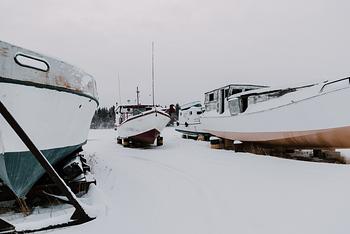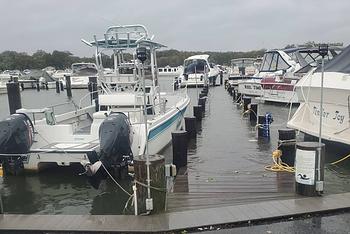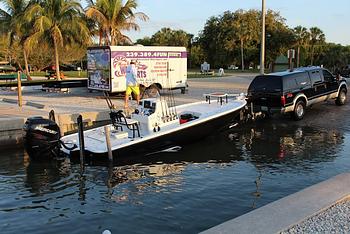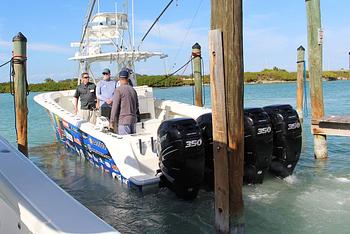Buying a boat trailer is a bigger decision than most people initially think. With lots of different styles and models to accommodate various shapes of boats and sailing yachts, there is no one size fits all when it comes to boat trailers. Having a trailerable boat provides a huge amount of freedom as well as reducing the costs of boat ownership with respect to mooring fees. Here we take a look at what you need to know to ensure you get the right trailer for towing your boat.
1. There are Lots of Different Types of Boat Trailers
Bunk Trailers: These are the simplest trailers on the market, and the least expensive to buy and maintain as they have very few moving parts. They are essentially made up of two long boards – known as bunks – which are covered in a soft material which support a boat’s keel on either side. The material also helps the boat slide on and off the bunks easily when loading and unloading, whilst also protecting it from scratches.
Bunk trailers need to be submerged in order to load and unload the boat, so you’ll need to consider which slips you’ll be using and ensure that they are deep water ones and tides don’t affect them. In addition, because the trailer gets submerged frequently it’s important to wash it down with fresh water after each use as brakes, hubs, springs and axles will be exposed to more wear and tear.
Best For: Smaller boats of less than 6 metres in length
Roller Trailers: When you only have access to shallow water for loading and unloading, a roller trailer is the best option. As the name implies, a series of cylindrical plastic tubes, or rollers, support the boat’s weight and allow it to slide into the water in a controlled manner. As such they don’t need to be submerged in the water as far as bunk trailers. They are usually reversed into the water so that the stern is floating and then rolled all the way in. Roller trailers are generally more expensive than bunk trailers, and because they have more moving parts, they can be more costly to maintain over the years.
Best For: Launching in shallow or tidal waters
Float-on Trailers: When a boat is too large or heavy to be pulled onto a roller trailer, a float-on trailer allows the boat to be placed on the trailer and secured before being towed out. Float-on trailers are backed into the water down a slip until they are fully submerged and then the boat is floated over it.
Best For: Larger boats, such as sea-going boats and pontoon boats, or ones which need deeper water in which to launch.
Keel Rollers: While these aren’t actually trailers in their own right, keel rollers are an important addition to a trailer when towing boats with keels. They are placed in the centre of a trailer to support the boat’s keel which wouldn’t have the correct support from a regular roller trailer. By adding a keel roller to the centerline of the boat trailer the keel is protected from damage when being, loaded, unloaded and towed.
Best For: Boats, particularly aluminium boats and sailing boats, which have keels.
2. Weight Matters
While different countries will have different legislation when it comes to how much weight you can tow on your specific driving license, the total weight of the car, boat and trailer is a calculation everyone will need to make before buying a trailer. Once you have this combined weight (taking into account fuel and extras on your boat), you’ll need to compare the value to the gross vehicle weight rating (GVWR) noted on the trailer’s VIN plate. This is the towing capacity. To be on the safe side, you should allow for about 15% extra than the total value.
3. So Does the Width
Once you have ensured that the weight is correct, make sure that the trailer you are considering is wide enough for your boat. While this may seem obvious, buying a trailer that is too narrow is a common mistake. It’s recommended that you allow for around 10cm of extra trailer width on each side of your boat so that you have plenty of room to secure it well.
4. Don’t Forget about the Brakes
There are different types of brakes on boat trailers, and these are relevant to the size of the boat you’ll be towing. Smaller boats on simpler bunk trailers will usually have some form of brake override system in the form of a cable that places pressure on the brake calipers when you brake. A larger boat on a more substantial trailer – and especially on double axle trailers - will be fitted out with an electric hydraulic braking system which provides important braking power when being towed. In addition, if the trailer detaches from the vehicle a break-away part will ensure the boat stops automatically and doesn’t continue to roll down the road. In some countries there are laws regarding brake requirements for different weighted trailers, so be sure to check your local regulations.
5. Choose from a Single or Multiple Axle Trailer
Once again it’s important to consider how you will be using your trailer and the types of manoeuvres you’ll be asking it to make. There are pros and cons of both single and multiple axle boat trailers, the pros of a single axle boat trailer mainly being its easy manoeuvrability. If you are going to need to get your trailer into tighter spaces such as a garage, driveway or smaller marina then this is the best option. They are also the least expensive option, and require less upkeep. Multiple-axle trailers on the other hand tend to be safer when being towed as they provide more stability, especially if a tyre blows out. On the downside, they can be harder to manoeuvre.
6. Consider What the Trailer is Made From
Trailers come in a variety of materials including aluminium, painted steel and galvanized steel. If you’re going to be loading and unloading your boat in freshwater locations then painted steel and aluminium will hold up well, while both of these materials will suffer from corrosion if you’re using them in saltwater where galvanized steel is by far the preferable material.
7. Give the Trailer a Thorough Inspection
While it may seem obvious to check out anything you’re buying, especially if it’s second hand, often trailers are overlooked when they’re part of a used boat deal. You will no doubt inspect your boat thoroughly, maybe even getting a boat survey conducted on it. The trailer should certainly fall within the scope of your research and investigation. Look to see that the wheel bearings are sound and there is no rust on them. Check that there is plenty of tread left on the tyres (around 4mm), and that the wiring, brakes and welded parts of the trailer are in good working order.
If you’re in the market for a trailerable boat, check out the hundreds of new and used boats listed on Rightboat.com. There is sure to be the perfect one near to you! We are the top online marketplace for the buying and selling of boats in the world, and trusted by hundreds of boat owners and brokers every day.




